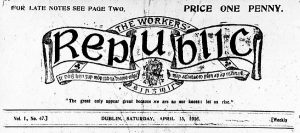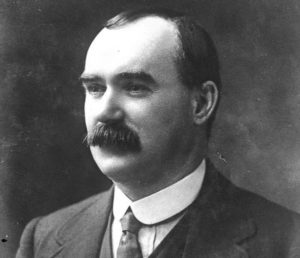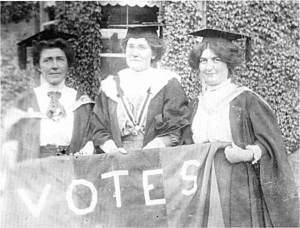
By Val Merlina, J.D. | University of Pittsburgh School of Law ’17
101 years ago, James Connolly was executed for taking part in the 1916 Easter Rising in Dublin, Ireland. An armed rebellion seeking to decolonize Ireland, the Rising helped start the Irish struggle for the end of British social, political, and economic control on the island. The rebellion brought together linguists, educators, socialists, women, the working poor, and concerned Anglo-Irish; they were remembered for their influences, and to many heroic contributions. Among these was James Connolly. We revisit Connolly’s life as a pro-worker, anti-imperialist organizer to offer some alternative paths for us to break away from the rise of fascism and xenophobia around the globe, and to urge those of white/European descent to align with immigrants, as Connolly did, and counter directly white supremacy, in particular among white working class.
Connolly’s Worker Republic

Connolly’s workers’ republic envisioned the end of colonization, and the protection workers from the rise of a wealthy Irish aristocracy. Connolly warned that after 800 years of colonialization, continued connection with British capitalists would threaten post-revolutionary Ireland:
If you remove the English army tomorrow and hoist the green flag …, unless you set about the organization of the Socialist Republic your efforts would be in vain. England would still rule you … through her capitalists, through her landlords, … through the whole array of commercial and individualist institutions she has planted in this country and watered with the tears of our mothers and the blood of our martyrs. …[I]f you ask me to [ignore] social justice [to] conciliate the privileged classes, then I must decline.
This warning not to align with capitalist interest to workers is relevant today as we see white working class aligning with corporate interests against their own due to internalized white supremacy and xenophobia.

Connolly’s Personal Background
Connolly was born in 1868 in Edinburgh, Scotland, to Irish parents in a slum called the Cowgate. From an early age, he took various jobs to help bolster family income, and at 14 he and his older brother joined the British Army for lack of employment options. He was deployed to Ireland and then to India. To Connolly, the British Army’s presence in India represented self-serving and profit-driven imperialist goals to conquer and repress. Ireland was no different, Connolly viewed it in the colonial context as Britain’s first colony. The continued subjugation of Ireland for use of human labor, military recruits, and raw materials and resources held back Ireland’s development and progress. Yet, the subjugation of Ireland for a prolonged period, while also acknowledging the countless other British colonies, was the source-draw for the growth of the British Empire and its spread throughout the world.
After leaving the military, Connolly worked with socialist groups in Ireland and became an organizer with the Industrial Workers of the World (IWW). With the IWW, Connolly gave lectures across Scotland, England, and the US to spread his message of worker solidarity. He was known as a dynamic speaker, aiming to unite all workers within an anti-imperialist, feminist, multi-lingual, pro-immigration, anti-racist, multicultural framework.
Connolly’s work as an IWW organizer brought him to the US for speaking tours. While there, his IWW comrades included Italians, Germans, and Jews among others; he learned Italian and German to communicate with immigrant audiences with whom he more closely related. Like himself, Connolly saw in the struggles of these immigrants to the US the similar cultural and ethnic mistrust and prejudice.
In the US, he heralded the usefulness of socialism to Irish Americans, advocated for unity between ethnic divides, campaigned for Eugene Debs for President, and spread the word of his Irish Socialist newspaper, The Harp. He was involved and ready to support workers’ goals. During his first tour in the US against the Steel Trust, Connolly came to the small industrial area of McKees Rocks outside of Pittsburgh’s city limits. When the editorial staff of the McKees Rocks local Socialist Party newspaper were charged and imprisoned for supporting the steel strikers, Connolly stayed to help guide the newspaper. In all, Connolly visited over 60 US cities. He drew crowds in cities large and small. When James Connolly used the word workers, he meant all workers everywhere in the world, and not just the ones in Edinburgh, those living in the slums of Dublin, or toiling in McKees Rocks, PA.
Connolly Returns to Ireland
Connolly’s return to Ireland was during a shift in militancy. In the north, the armed Ulster Volunteers formed in 1913 to protect the interests of Anglo ascendancy in the majority Unionist, loyalist, and/or Protestant population. As a response in the same year, the similarly-armed Irish Volunteers formed in part of the 1858-established Irish Republican Brotherhood (IRB) to stand in favor of Irish Home Rule with less British governmental control. Simultaneously, workers in Dublin sought to protect their own interests after the 1913 general strikes across the Empire’s Second City ended in blood. Employers locked workers out for a total of six months, and called in the Dublin Metropolitan Police and Royal Irish Constabulary to put down the workers’ revolt in a “police riot.” Thus, tenements were raided, two were beaten to death, and over 500 union members and bystanders were hospitalized on what became known as 1913’s “Bloody Sunday.” In the aftermath, Irish labor leader James “Jim” Larkin formed the Irish Citizen Army (ICA) to protect trade union members while on strike against police brutality. By 1914, Larkin put Connolly in charge of the ICA with the ideals that “the ownership of Ireland, moral and material, is vested by right in the people of Ireland.” From Liberty Hall, a building that served as a base for radical politics in Dublin, Connolly and the ICA planned a worker uprising, opposed British capitalism in Ireland, and denounced World War I.
Connolly continued his work at Liberty Hall despite close government monitoring. When IRB leaders Tom Clarke, Sean MacDiarmada, and Pearse learned of Connolly’s plans, they urged him to join forces with their organization for a joint rebellion. The unification of the ICA with the nationalist forces was not Connolly’s first choice but necessity brought them together. Connolly’s involvement sparked the inclusivity of women and working people to join the Rising.

In the era of women’s suffrage, Connolly saw no difference between women’s movements and the working-class struggle; they were willing to fight for language and voting rights, and better working conditions. A well-known militant socialist, feminist couple, Francis and Hannna Sheehy-Skeffington, noted that Connolly was a friend to feminism, and described him as “the soundest and most thorough-going feminist among all the Irish labour men.”
The Call to Action: 101 Years After Connolly’s Execution
Americans can learn from Connolly’s ideas of solidarity and the connection of social movements. When leaders seek to divide and destroy shared societal aspirations, solidarity and unity is key. Connolly would remind us these movements are connected intimately with workers’ struggles – economic earning power of all workers everywhere impacts who has political voice and power. Connolly would ask us to support workers and their decisions to form associations, unions, or guilds. Workers’ ability to build power has been limited by employers, shop-owners, tycoons, barons, kings, and capitalists since compensation for work had been first earned. We must not vilify the working person as the powerful have done, lest we also become an oppressor.
Black and brown bodies were stolen, enslaved, abused, and mistreated, and on their backs the frameworks of US infrastructure were built. I acknowledge these facts as historical truth, and I call for white Americans to understand, accept, and spread this truth to fight against continued white supremacy.
Further, I want to address all those of European descent in the US. Here is my call to you: the immigrant workers Connolly sought to unify in the US during his tours were mistreated. These are some of your ancestors; I know they were mine. Your ancestors faced prejudices, and pressures to assimilate stripped them of their language and customs. This should not sound unfamiliar to what some whites are doing currently to the multitudes of languages spoken in cities today. It’s abusive and racist to act this way towards those keeping customs while making a new life and/or seeking refuge. It was similarly abusive and prejudiced for privileged capital-holders to mistrust Catholics, to mock non-English speakers from Europe, and to shoot down workers in the earlier half of the 20th century.
Individuals of European descent: we can help stop a cycle of intolerance toward immigrant, migrant, refugee, asylum-seeking, and visa workers. My grandparents faced prejudices in their home nations in Europe, and then again in the US after immigration; I’ve heard their stories. I won’t forget their hopes and struggles as immigrants. Similarly, I refuse to forsake the optimism of current US newcomers, and I will not ignore the racially-intensified tribulations they face because of prolonged white supremacy.
Those of European descendants: I ask also that you seek the capacity for empathy. Find in yourselves the fact that you can help spreading acceptance – something your ancestors sought. Capable and successful immigrant, migrant, refugee, and asylum-seeker-support groups are run by diverse groups of people. Give your time to these groups and be willing to stand with immigrants, migrants, refugees, and asylum-seekers. For the purposes of this article, recall that’s what Irish socialist revolutionary Connolly asked his audiences to do in the early 1900s.
In regards to immigrants, let us recognize why so many arrive to a new land – more promising economic earning power. Immigrants do/have strengthened worker associations, unions, and guilds in America by applying their skills, work, and culture to the workforce, yet are/were usually shunned. The current pro-worker labor movement in the US must embrace immigrants and recognize shared interests and struggles between all workers. The immigrant or migrant’s status as a worker links her with workers across the world, each of them facing and shaping their unique narratives. The wealthy and powerful of the world demonstrate through their oppressive actions that capital is deemed more valuable than people. Now, we must reaffirm that people are to be regarded above profit. Our shared future as workers and as human beings depends on it. An injury to one is an injury to all.
Sources available upon request.
Val Merlina studied history and graduated from Gettysburg College in 2014, and graduated Pitt Law in 2017. While at Pitt, she completed internships with the Abolitionist Law Center, the Pittsburgh Federal Public Defenders, the United Steelworkers Legal Department, Law at the Margins, and under Kosovo General Assembly elected official Vjosa Osmani in Prishtina, Kosovo to complete guided policy/legal research. She is a member of the NLG Labor & Employment Committee, and was a committee organizer with the Pitt graduate student worker union campaign. Outside of legal studies, Val has a special interest in the Irish language (Gaeilge) and political history, and studied abroad in Dublin and Belfast for a semester in 2013.





Val–This is an outstanding historical article. You could include some of the memorial in Troy, NY so show that Connolly’s organizing efforts have not been totally erased in the US. Your points on immigration and the rebuilding of Irish society are terrific.